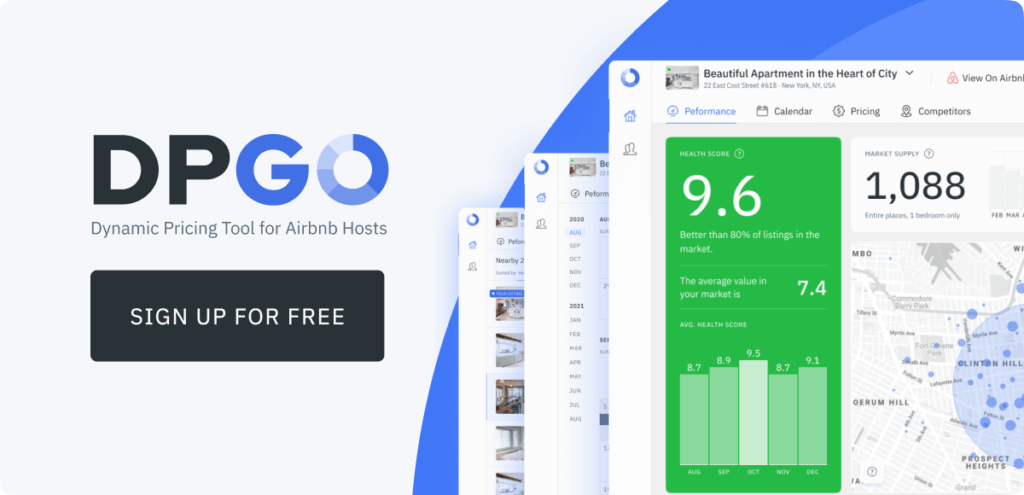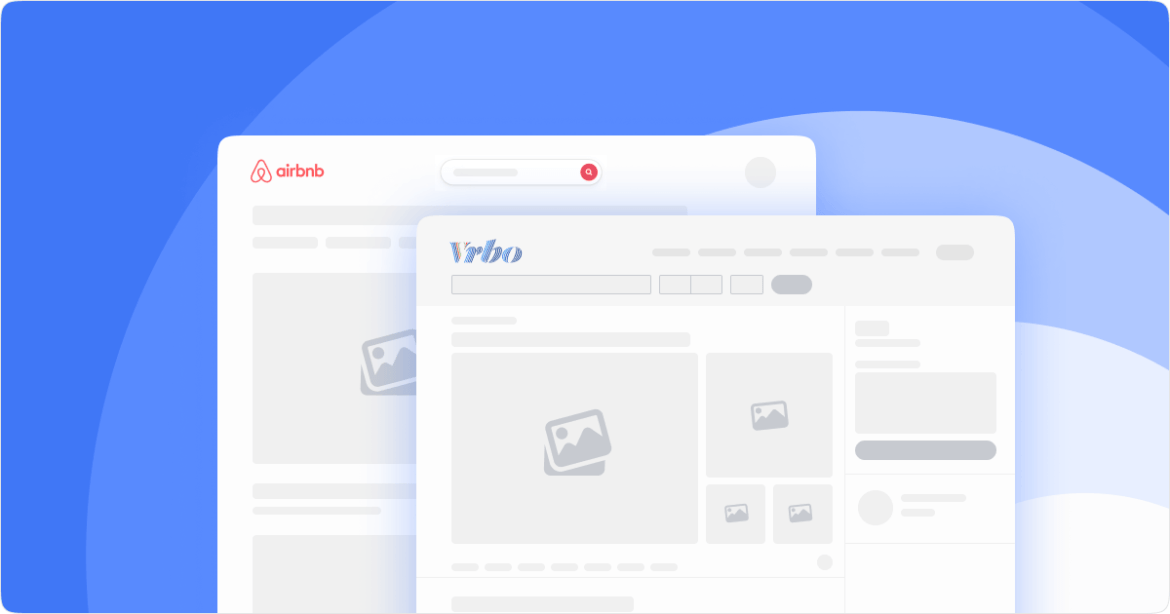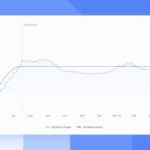Airbnb vs Vrbo has been a discussion raging for years. Staunch supporters of each platform swear their choice is the better for business, but what do the numbers say? Which platform is more profitable and more popular? Which platform supports their hosts more? The answer to these questions and more sit just below, in our comprehensive Airbnb vs Vrbo report.
As you know by now, we operate with Airbnb mostly, but if you connect to DPGO through a property management system, we can still optimize prices with data-driven insights.
Let’s jump straight into the Airbnb vs Vrbo discussion…
Airbnb vs Vrbo Overview
Generally speaking, Airbnb and Vrbo both offer very similar services. They both focus on vacation rentals and they both charge hosts and guests for every transaction.
Listing your property is free on both platforms, but the charges do vary between the two and depending on whether you’re a guest or a host.
Vrbo boasts over two million properties in 190 countries across the globe. Airbnb boasts over 7 million listings spread across 220 countries. At last count, Airbnb had over 150 million guest users. Vrbo doesn’t release user statistics, but the company has said that “Vrbo users created 15.7 million Trip Boards this past spring and summer”. This does not mean all 15.7 million Trip Board were converted into actual bookings, but it does give insights into their general use numbers.
Most see Vrbo as more of a ‘whole host’ rental site, whereas Airbnb is viewed as a platform that caters to all travelers’ needs. Vrbo does not rent shared room listings, they are more common on Airbnb.
Airbnb offers Guest Experiences on its platform. These include cooking classes, tours, horse riding, fishing, and so on. Airbnb Experiences were celebrated by hosts on the platform as it allows them to make money in some form even when their property does not get rented. Vrbo does not offer any sort of guest experience option.
Airbnb vs Vrbo Charges
In terms of charges, Airbnb and Vrbo have pretty different approaches.
Vrbo offers hosts two payment options: Subscription or Pay-Per-Booking. The Subscription option sees hosts need to pay $499 upfront for the year. For the Pay-Per-Booking option, the amount you pay depends on the value of your confirmed bookings as it works on a percentage scale.
Host fees on Vrbo start at 8% with 5% of this as a service fee and the other 3% is a payment processing fee. Guest fees on Vrbo range between 6% and 12% as a booking fee.
Airbnb also offers two payment structures, but the choice of which payment structure is not always up to the host to decide. Depending on where your listing is located, Airbnb either splits the fee between host and guest, or it places all the charges on the host. You can learn more about host-only fee structures here.
In the former option, hosts pay between 3% and 5% as a service fee, and guests pay anywhere up to 14.2% as a service fee. The host service fee is a percentage of the total price, which includes cleaning fees and extra guest charges.
Cancellation Policies
Both companies offer a range of cancellation policies. Vrbo offers five cancellation policies and Airbnb offers six cancellation policies.
Vrbo cancellation policies are as follows:
- No Refund – This means Vrbo hosts do not have to give a refund ever, for any reason.
- Strict – Full refund if guests cancel 60 days before the start of the booked stay. No refund if they cancel later.
- Firm – Full refund if guests cancel 60 days before the start of the booked stay. 50% refund if they cancel 30 days before the start of the booked stay.
- Moderate – Booking canceled 30 days before the start of the booked stay will get a full refund. Bookings canceled within 14 days of check0in get a 50% refund.
- Relaxed – Bookings canceled at least 14 days before check-in will get a full refund. Bookings canceled at least 7 days before check-in will receive a 50% refund.
Airbnb cancellation policies are as follows:
- Flexible – Full refund if a guest cancels at least 24 hours before check-in.
- Moderate – Full refund if a guest cancels at least 5 days before check-in.
- Strict – The Strict policy means that guests can cancel up to 48 hours after making the booking, provided that the date of check-in is not within 14 days. To qualify for a 50% discount, guests need to cancel 7 full days before the local check-in time. If the guest cancels within 7 days of check-in, no refund will be granted.
- Long-Term – Fully refundable for 48 hours after booking confirmation, provided that the cancellation occurs at least 28 days before check-in. If the guest cancels within 28 days of check-in, the first month of the booking and the booking fee are both non-refundable.
- Super Strict 30 Days – For a 50% refund, guests must cancel a minimum of 30 full days before check-in. If a guest cancels at any point within 30 days before check-in, the booked nights will not be refunded.
- Super Strict 60 Days – For a 50% refund, guests must cancel no less than 60 days before check-in. When a guest cancels within 60 days of the scheduled local check-in time, the booked nights will not be refunded.

Reviews
Vrbo gives its hosts and users up to one year to submit their reviews. However, once one party submits their review, the other party has just 14 days to submit theirs. Interestingly, Vrbo does not publicly display traveler ratings. Listing ratings are displayed as usual.
Airbnb offers guests and hosts 14 days after check-out to write a review. Airbnb will only publish the reviews once both parties have submitted, or if that 14 day period has elapsed.
Which Platform Will Earn Me More Money?
Profitability has more to do with how you manage your listing than which platform you like on does. We have a few simple tips on how you can optimize the running of your short-term rental listing, no matter which platform you use.
As a starting point, trying data-driven pricing is a great way to kick off the optimization process. Without market insight, your pricing is just a ‘best guess’ scenario and you could be scaring away bookings with prices that are too high or leaving money on the table with rates that are too low.
Modern dynamic pricing engines like DPGO use real-time data collected from your local market in conjunction with global data, competitor analysis, currency exchange rates, booking fluctuations, social media buzz, and more to arrive at the perfect price for your listing on any given day.
We’d never ask anyone to pay for a service before they experienced the benefits firsthand, which is exactly why we are offering a free 30-day trial with us! You’ll have full access to all DPGO features for 30 full days to experience the increase in revenue and occupancy rate for yourself!




4 Comments
Pingback: What are the key pillars of a profitable Airbnb business?
Pingback: Advantages of Using Property Listing Sites
Pingback: 4 best Airbnb Alternatives for Homeowners Technonguide
Pingback: How to Turn Your Home Into a Luxurious Vacation Retreat - Uncustomary